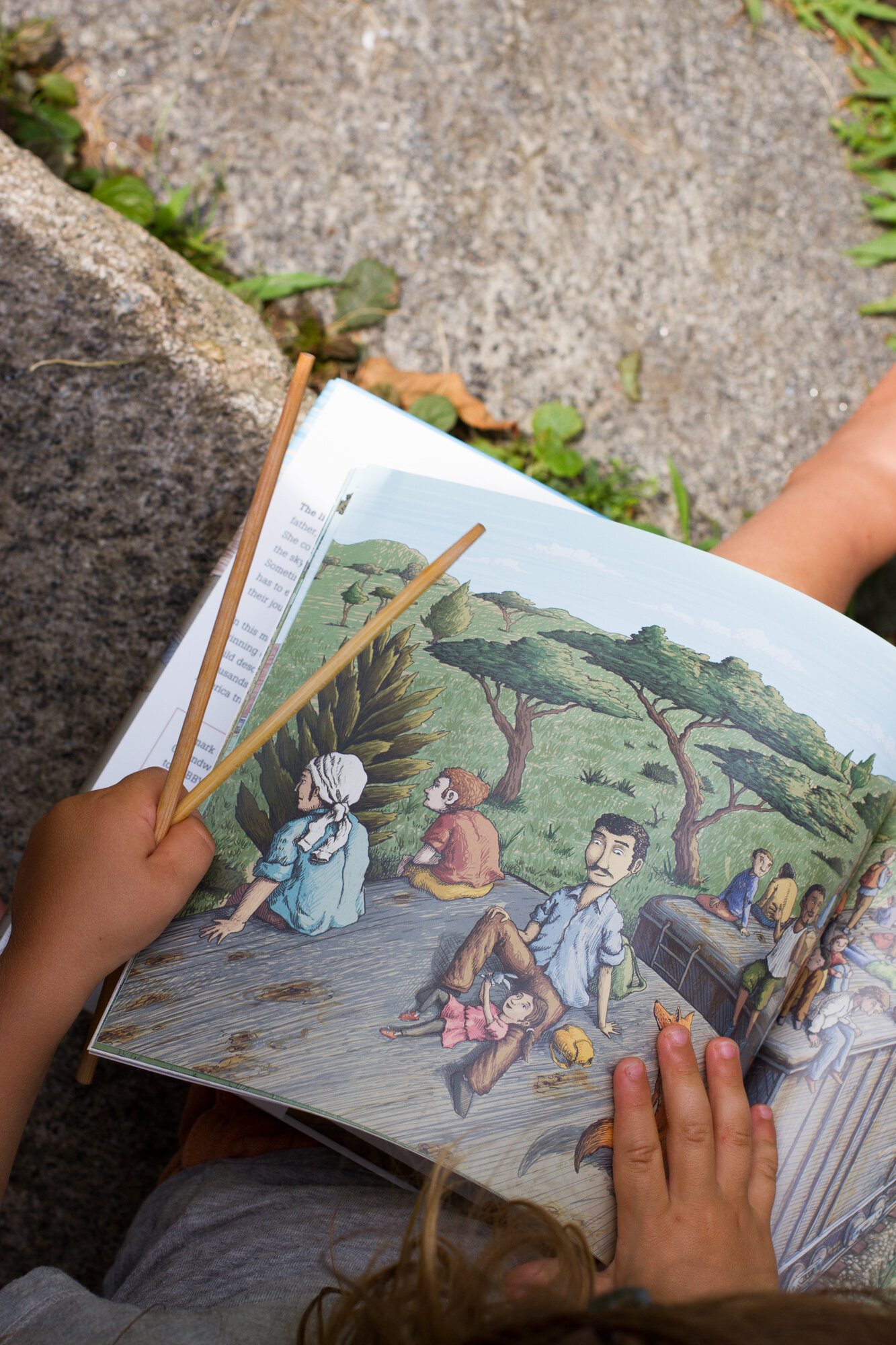
While I witness an administration actively working to terrorize immigrants and to demonize the families seeking to cross the US-Mexico border, I feel the need more than ever to have frank, age-appropriate, humanizing conversations with my kids. Books help.
Today’s post is a collaboration with The Conscious Kid, one of my favorite places to find smart, thoughtful, research-backed recommendations for children’s books (among other things). The list of children’s books that they recommend below recenter the families caught in the maelstrom of flawed immigration policy. Through words and pictures, children and adults alike are reminded of the hardship, the struggle, and the dangers faced by immigrating families. Above all else, these stories showcase the humanity of the people who risk everything to seek refuge in the United States. More than providing insight into someone else’s reality, in these stories immigrant children can also see their own stories reflected back at them—stories of fortitude, resilience, joy, and sorrow.
Immigrants from around the world come to United States, but we’ve decided to focus our attention on stories about folks coming to the US from Central America and Mexico—the folks who are at the center of the current crisis at the US border and in detention centers across the country. (More information on what you can do to help folks impacted by this crisis are at the bottom of this post.)
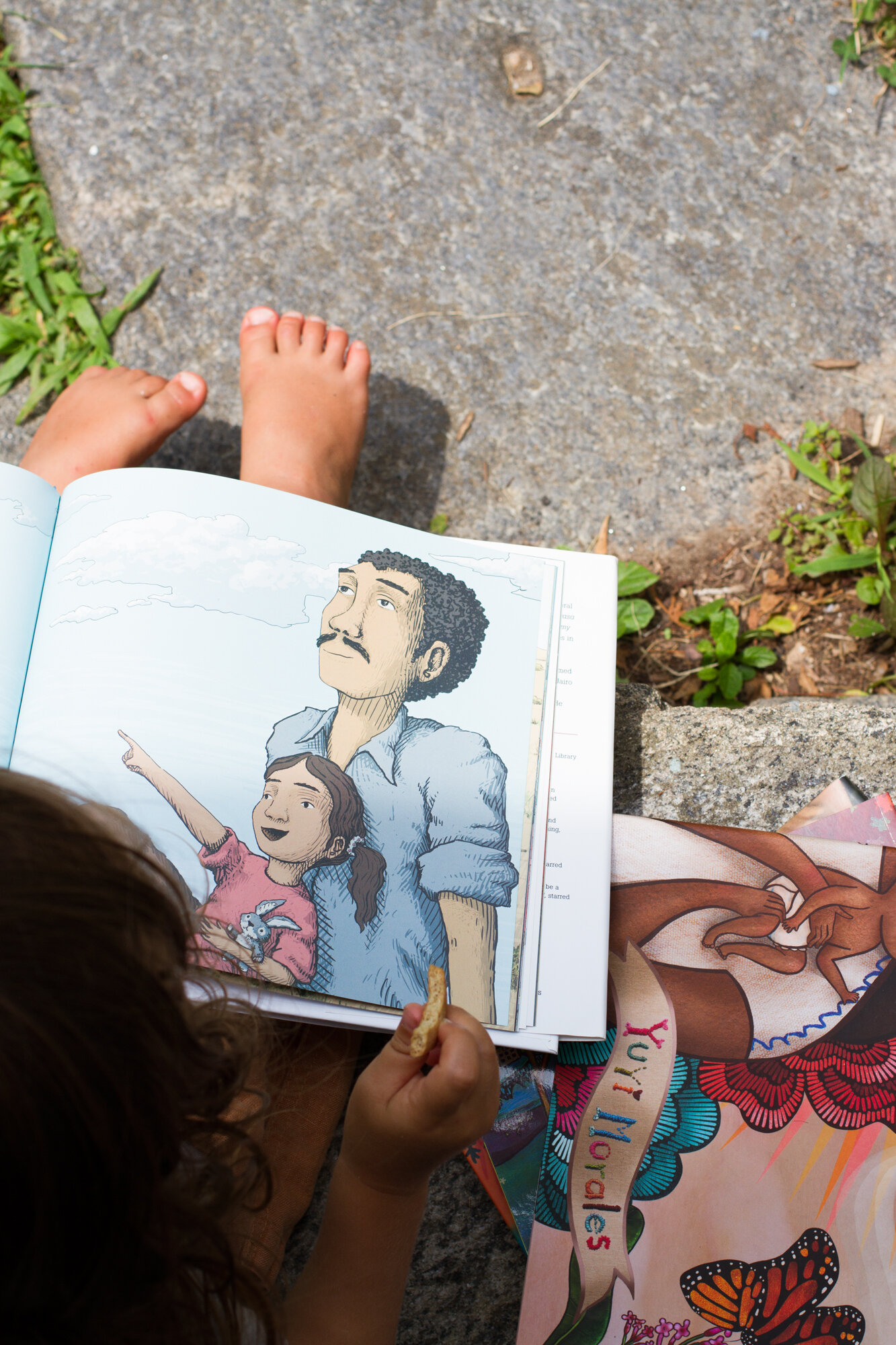
Here are six Conscious Kid-approved titles:
TWO WHITE RABBITS, words by Jairo Buitrago and illustrations by Rafael Yockteng [pictured above]
A little girl traveling from Central America with her father recounts her experience as a migrant with the poignant simplicity of a young child. As she and her dad make their journey to the border on top of train cars and in the back of pickup trucks, she counts the clouds and chickens and soldiers on their path and asks over and over, “Where are we going?”
DREAMERS, words and pictures by Yuyi Morales
This book is inspired by the story of the author’s own journey to the US. In 1994, Yuyi Morales and her infant son, Kelly, made their way across the bridge from Juarez, Mexico to El Paso, Texas. As they struggled to find their way in their new home and learn a new language, they discovered the public library. There they learned to read and write and tell their own stories. This beautifully illustrated carries a simple message of hope and resilience.
LA FRONTERA: EL VIAJE CON PAPA / MY JOURNEY WITH PAPA, words by Deborah Mills and Alfredo Alva, illustrations by Claudia Navarro
This vibrantly illustrated book tells the story of author Alfredo Alva, who immigrated to Kerrville, Texas with his father when he was eight-years old. The detailed story is written in Spanish and English and follows the young boy’s journey to the US, his adjustment to his new life, and his eventual reunion with his mother and siblings. Historical notes at the end of the book provide further details and context for kids and parents.
PANCHO RABBIT AND THE COYOTE: A MIGRANT’S TALE, words and pictures by Duncan Tonatiuh
In Spanish, the word coyote has two meanings: It’s the name of the sly animal we know from folktales, and it’s also slang for the people who smuggle migrants between the US and Mexico border. In this allegorical folktale, young Pancho sets out to find his father who has gone north to work in the lettuce fields. Along the way, Pancho meets a sly coyote who offers help in exchange for the provisions Pancho has brought for the journey. The coyote demands Pancho’s food, until there’s nothing left to eat but Pancho himself… A timely rescue by Pancho’s dad and a triumphant return home speaks to the enduring strength and love of family. A detailed author’s note and glossary provides helpful context and resources for adults and older children.
MANGO MOON, words by Diane de Anda and illustrations by Sue Cornelison
The lives of Maricela, Manuel, and their mother are forever changed when their dad and husband is taken away. Told from the perspective of young Maricela, Mango Moon provides a heartbreaking look at the confusion and heartache experienced by children who are separated from their parents through deportation. Maricela finds comfort in memories of her dad—and the mango-colored moon—while also mourning her father’s absence and struggling to come to terms with the new realities of her family’s day-to-day life.
A MOVIE IN MY PILLOW / UNA PELICULA EN MI ALMOHADA, poems by Jorge Argueta and illustrations by Elizabeth Gomez
Poet Jorge Argueta immigrated from El Salvador to San Francisco’s Mission District at the start of the Salvadorian Civil War in 1980. This collection of children’s poems—presented in both Spanish and English—depict Jorge’s childhood memories of his birth country and his experience in the community his family found in the United States. The poems explore the simultaneous sense of both belonging and loss that’s so often a part of the immigrant experience.
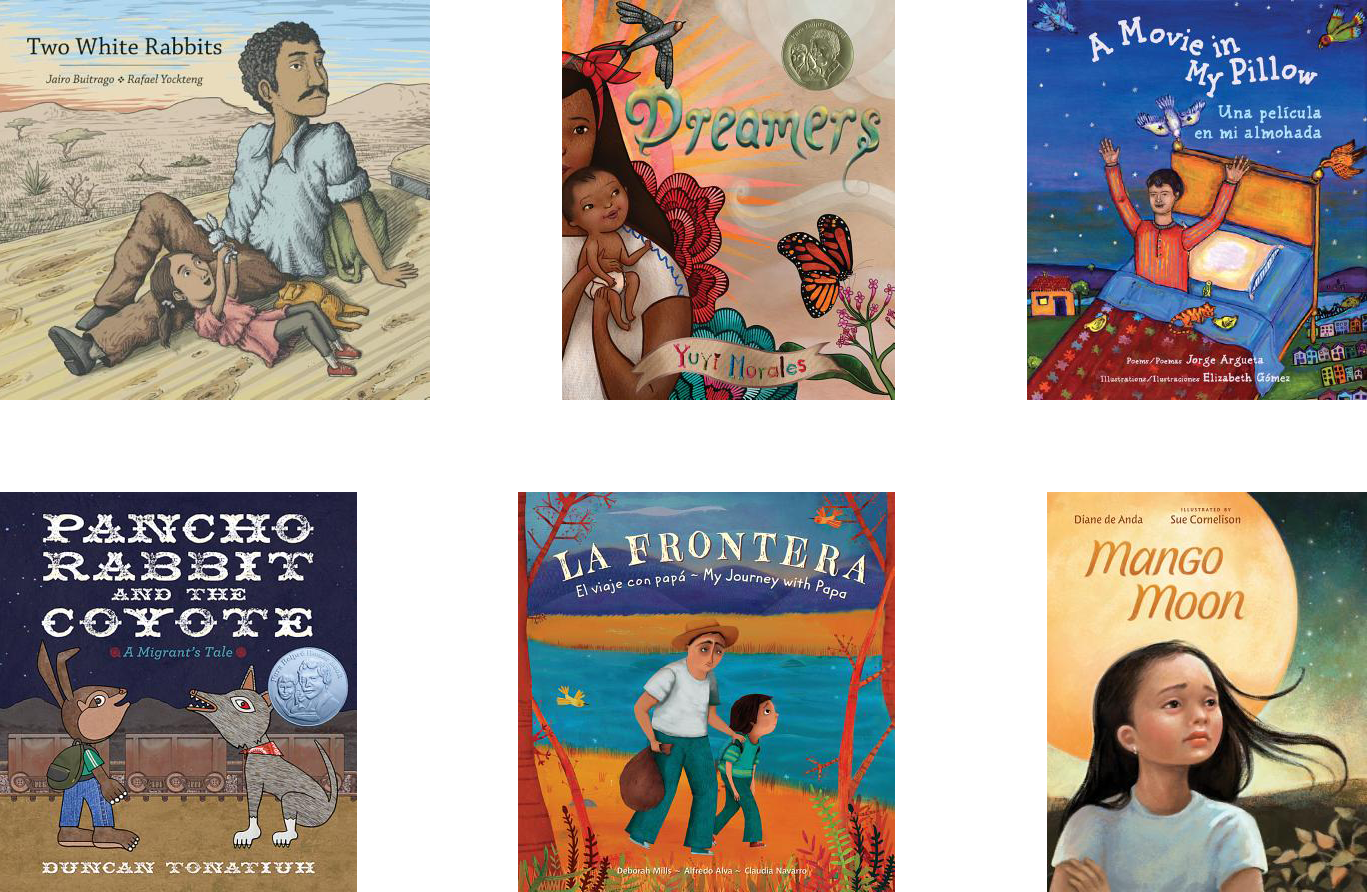
Action Items:
+ Donate: Seven is the number of immigrant children known to have died in immigration custody. Do you have $7 to donate in their honor? The Decolonizing Childhood Coalition is organizing a fast-action fundraiser to support the Immigrant Families Together General Fund. As of this morning, they’re only $170,000 away from their $1 million goal. Let’s get them there.
+ Protest: Tomorrow, July 12, 2019, communities across the country (and the world) are gathering at detention centers, city halls, town greens, and backyards to protest the deplorable treatment of immigrants. Find a local Lights for Liberty Vigil or create your own and stand in solidarity with immigrant communities.
+ Talk to kids. Getting children involved in these discussions is crucial, but no doubt reading some of these books will bring up difficult conversations. If you need support on how to broach conversations about race and injustice with children, The Conscious Kid’s Spring 2019 Instagram series #DisruptingRacismWithKids is an excellent starting point.

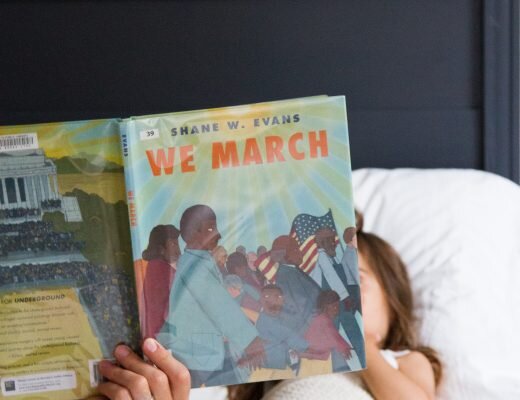
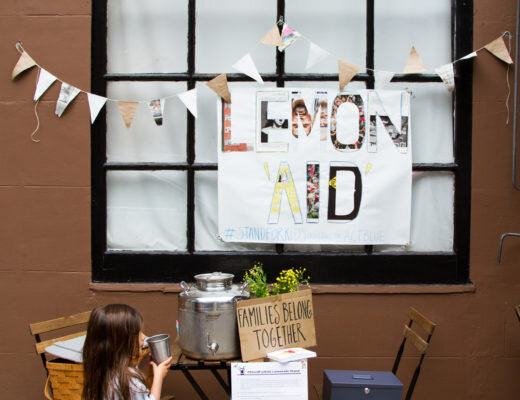

11 Comments
I’m crying. Thank you for the beautiful ways you show support and encourage others in these terrifying times.
On another note, I’m going to be visiting family in El Paso in August and I would love to find a way to do some hands on helping. I’m not sure I can get up the courage to go protest as the only in-country parent of my child on this short trip. I’ll definitely do some searching online but just thought I’d see if anyone knows of any orgs to look into.
Perhaps I got this suggestion here before, but we have also loved La Mariposa by Francisco Jimenez. It is a lovely autobiographical story from the author’s youth that charts his adjustment to the United States as the child of migrant farmworkers. My daughter enjoys it.
Not a children’s book, but – going through old books, to keep or donate, this afternoon, I cracked open a college poetry collection and fell on this – https://www.poetryfoundation.org/poetrymagazine/browse?contentId=40513. How unconscionably lucky I and my family are to feel like any Tom or Harry at border crossings. Thanks so much for continuing to shine a light on this crisis.
Always grateful for your action posts, and the general well-roundedness of this blog <3
Thank you for this. My son is still too young to understand any of these books but I’ve already started amassing a collection of books with poc protagonists, gender fluid protagonists, messages of inclusivity and social justice. One of my biggest goals as a mom is to raise him to be someone who defends those who don’t hold his privileges.
Not about families crossing the border but along those lines another good one is The Wall in the Middle of the Book — it’s metaphorically talking about fear of the other and the unknown and ends with the xenophobe main character realizing that his fears about the supposed dangers on the other side of the wall are unfounded.
https://www.goodreads.com/book/show/37969835-the-wall-in-the-middle-of-the-book
Is getting children involved in these discussions crucial, though? Crucial for what purpose? Empathy, understanding, resilience, and acceptance can be taught in so many ways. I struggle so much with what’s going on and I can’t imagine bringing my young children into this complicated adult conversation when it’s not on their radar. How fortunate they are, and for such a tiny, precious amount of time.
I can appreciate these beautiful books for older children, and thank you for this resource. But as an introduction to the atrocities that are occurring, I’m not sure I’m on board.
For many children, including my own, these stories are already on their radar, if not also directly impacting them. I do believe that finding age-appropriate ways to discuss them is crucial. We live in community with children who have undocumented parents, with families who have recently immigrated to the US, with folks who actively fear this weekend’s ICE raids. In other communities and in other places in the country, this is no doubt even more true. Above all else, this is also a list of books where, as mentioned above, children living through the experience themselves can see their own stories reflected. Many of these books are written in Spanish and English and some of them like Dreamers and Two White Rabbits are available in Spanish-language versions. This isn’t merely about the white gaze, but about representation. In schools and communities across the country, books like these help children to understand their own world and experiences and the experiences of people closest to them. More than teaching kids empathy, understanding, resilience, and acceptance, we need to also teach children about systems of injustice. The joint letter from Decolonizing Childhood Coalition that I linked to above, provides an especially concise argument from educators about why that’s important.
Thank you for linking to the Immigrant Families Together General Fund. I cannot make the candlelight vigil tonight so making a donation made me feel I was doing something. What I’d really like to do is tear down the prison camps and kick a lot of ass.
Thank you….Would you mind if I share this on facebook? I will not if you do not want me to.
Perhaps I might share it on my blog?
Hi there! Absolutely fine to share a link to this post on Facebook or your blog!
A lovely list. I look forward to adding a few of these to my book basket.
Comments are moderated.